5 Essential SEGA Soundtracks On Spotify
SEGA just dumped a huge collection of game soundtracks on the popular streaming service. Here's where you ought to start.
This article first appeared on USgamer, a partner publication of VG247. Some content, such as this article, has been migrated to VG247 for posterity after USgamer's closure - but it has not been edited or further vetted by the VG247 team.
Wouldn't you know it? I finally cancel my Spotify premium subscription for lack of use, and a week later the service suddenly gets a massive dump of music I actually want to listen to.
Out of nowhere, SEGA has uploaded nearly 50 CDs' worth of game soundtracks to Spotify. This is a far cry from the full extent of the SEGA music library (that would probably be thousands of albums), but it covers a pretty impressive span of the company's history and musical modes alike. You have the really vintage stuff (Alex Kidd and Phantasy Star), fighting games (Virtua Fighter), modern-style action games (Shinobi and Kunocihi for PlayStation 2), a ton of Sonic soundtracks, and even some games actually centered around music. It's a lot to dig through, and while you'd be hard-pressed to find a genuinely bad SEGA soundtrack, not all their music was created equal. Rather than stumbling blindly through the Spotify SEGA catalog, why not start with these prime cuts first?
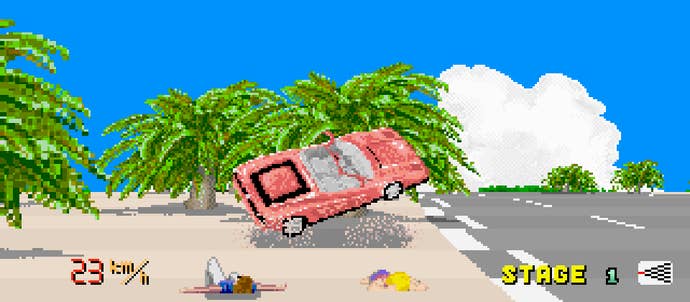
Out Run
I reviewed the vinyl release of Out Run last year and found it to be, simply, wonderful. Now that you can stream the entirety of that soundtrack release (including the new 3D Out Run tracks!) through Spotify... along with an additional two and a half CDs' worth of music from the rest of the series. Turbo Out Run! The tragically overlooked OutRunners! OutRun 2! It's hard to say anything on this three-disc collection quite lives up to the brilliance of "Magical Sound Shower," which kicks off the collection (and appears in several memorable remakes throughout the set)... but even if Out Run's music peaked early, it's all still totally great, totally listenable, and totally worth your time. SEGA created the idea of chill listening for high-speed racing games with the original Out Run, and few have ever come close to pulling it off with this much panache.
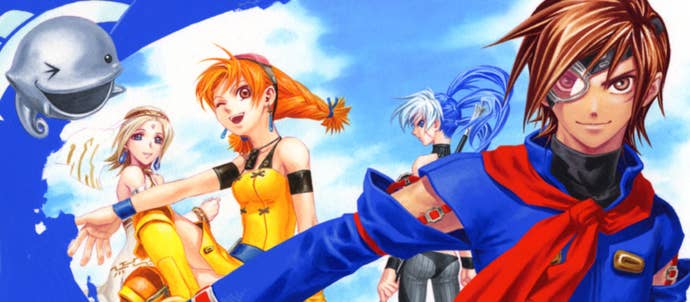
Skies of Arcadia
We were never graced with a proper single-player successor to Phantasy Star IV under the Phantasy Star name... but Skies of Arcadia came pretty damn close. A grand and sweeping adventure in the classical RPG mold, Arcadia offered a refreshing alternative to the increasingly grim direction Japanese role-playing games had been taking in the years immediately preceding its release. No dour anti-heroes, no tortured romances, no overly convoluted play mechanics — just an upbeat journey of discovery against a cartoonishly evil empire, punctuated by incredible large-scale airship battles with unknowable ancient forces.
And the music! The music was so good. Largely playing out with fake but soaring symphony orchestras, Arcadia wasn't afraid to dabble in other genres and formats in order to help paint a sonic picture of its faroff lands. Heavy drums in the thick jungles of the South America-like realm, traditional Asian flutes in the China analogue, and so forth. There aren't really any surprises in this collection of music, much as in the game itself... but that's kind of the point, really. It's good, solid, soul food RPG music, with just enough fun detail to keep it interesting. Check out the way the airship themes shift dynamically to reflect the current territory you're passing through, or the heroic transition to a rallying theme midway through the major battle themes to indicate you have a bad guy on the ropes. Great stuff.
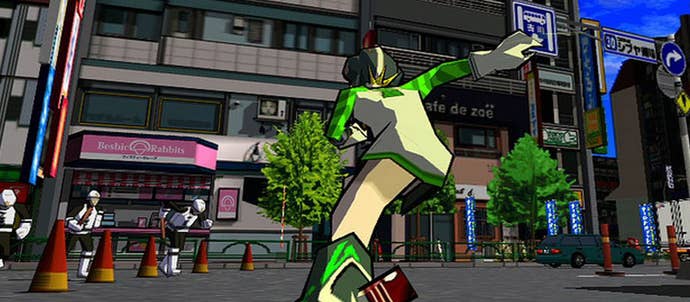
Jet Set Radio
Hideki Nakanuma is a musical genius. Jet Set Radio ("Jet Grind Radio" if you're nasty) sounded like no game before it had. Combining Japanese pop, hip hop, club music, and the occasional hard rock lick, his work for the Dreamcast classic stands as, arguably, one of the truly landmark moments in the annals of video game music.
It's a strange, eclectic blend of different ideas, throwing together a number of disparate influences and elements right from the beginning. Consider the first track, "Let Mom Sleep," which combines a heavily processed drum beat, record scratches, House of Pain-style screeches, synthesizer chords sampled from Paula Abdul, dialogue clips culled from other songs and radio talk programs, and a number of sound effects to reinforce the themes of the game (e.g. police sirens). Nakanuma somehow molds this melange of disparate components into an energetic composition that sets the stage for the game (and tunes) to come.
The Jet Set Radio soundtrack changes tempo from track to track, sometimes going full throttle, sometimes taking a more laid-back approach. But it's always great, and it always takes its cues from the playbook established with that opening track: Lots of great grooves, funky guitars, vocal and musical samples, record scratches, and just a hint of weirdness to tie it all together. It's a very of-the-moment, turn-of-the-millennium collection of music, and it paved the way for a new approach to music in action games.
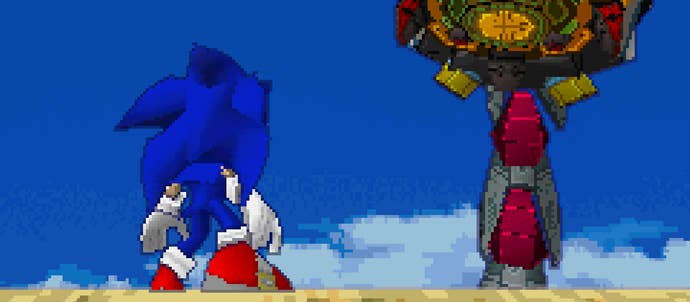
Sonic Rush
SEGA included quite a few Sonic soundtracks in its giant music dump, but the collection turns out to be curiously light on vintage Sonic. The closest we really have is Sonic Rush, which hearkened back to the old-school Genesis days with its 2D platforming action.
In terms of audio, though, Sonic Rush was nothing at all like the series' formative era. There are no chiptunes here, no warbling FM synthesis bursts. Instead, this game takes many musical cues from Jet Set Radio — it's another Naganuma joint — but with a bit more of the wailing butt-rock you kind of associate with Sonic. It features tons of loops, heavy drum-and-bass patterns, distorted guitars, and a remarkable number of vocal themes. This may not be "classic" Sonic, but it's definitely Sonic at its coolest. The words "cool" and "Sonic" may seem to sit at odds with one another these days, I realize. It works, though. A collection of great, if largely forgotten, music from one of Sonic's more overlooked games.
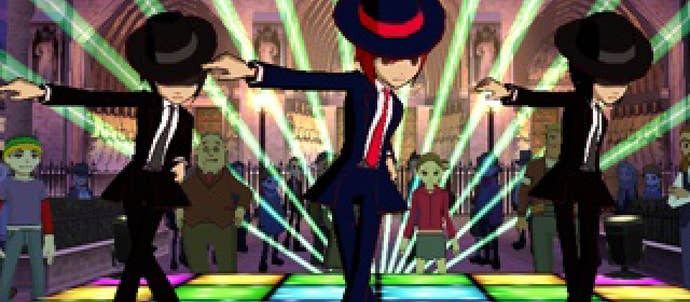
Rhythm Thief & the Emperor's Treasure
And finally, I'd be remiss if I didn't give a shout to the actual music-centric game on this list. Rhythm Thief seems destined to show up on "cult masterpieces that cost a lot of money now because no one bought them" lists a few years down the road, but thanks to Spotify you can be all hipster-y about it. "Rhythm Thief? I was streaming that game's music back when it was free," you'll say, smugly using a vintage handkerchief to dab a stray droplet of kombucha from your Salvador Dali mustache.
Released back in the early days of the Nintendo 3DS, Rhythm Thief was a pretty hard sell: A portable rhythm game based around a Lupin Arsene-like criminal who marauds through Paris, performing heists to the beat of what I could only describe as "techno chamber music." While it may not have been a winning formula for sales, the game itself was wonderfully made and crammed with all the little flourishes you've come to expect from SEGA. And the soundtrack — well, it's like nothing else you've ever heard in a video game.
A highly story-driven game, Rhythm Thief contains a healthy mix of both beat-driven music for its play sequences and less intense tunes that underscore its cut scenes. The story compositions tend to consist of fairly straight big band jazz with lots of horns and reeds, or else chamber music with strings and harpsichord. You'd think this might make for uneasy listening when the processed electronic drum-and-bass kick in, but it works remarkably well, as most of the analog instrumentation carries over into the game sequences. There's a comfortable rhythm to the soundtrack, with the narrative compositions building up to the game events... and there's a ton of music here, with unique compositions throughout the game. It's a work of love, and that creative investment definitely pays off.
